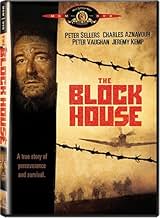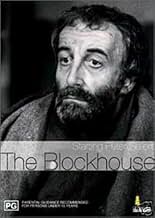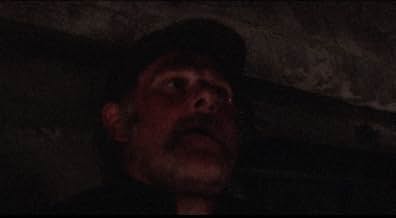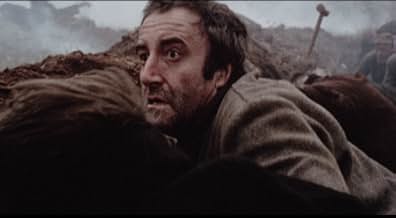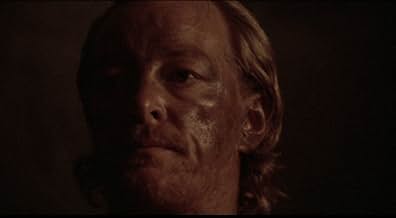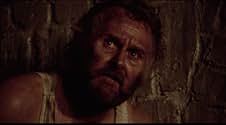Ajouter une intrigue dans votre langueDuring D-day several people become trapped while hiding in a bunker, when heavy shelling collapses it. They have plenty of food and water so they decide to wait for rescuers. And so they wai... Tout lireDuring D-day several people become trapped while hiding in a bunker, when heavy shelling collapses it. They have plenty of food and water so they decide to wait for rescuers. And so they wait year, after year, after year.During D-day several people become trapped while hiding in a bunker, when heavy shelling collapses it. They have plenty of food and water so they decide to wait for rescuers. And so they wait year, after year, after year.
- Réalisation
- Scénario
- Casting principal
- Récompenses
- 1 nomination au total
Avis à la une
The DVD box for "The Blockhouse" says "A true story of perseverance and survival". The same could be said for the audience. The constant darkness, illuminated only by candles, cannot shed enough light on this story of seven men, trapped underground for six years. As entertainment the film is a failure for three reasons. 1. The claustrophobic darkness is depressing. 2. The lack of any background or character development means a "so what" as far as differentiating who we like or dislike. 3. The abominable audio quality of the DVD makes understanding what is being said impossible. What you are left with is a dark, depressing, boring, and unintelligible movie. Not recommended. - MERK
We're told in the opening credits that this is a true story and only two out of seven survive. We then move into a superb opening sequence of Allied bombing, which takes us neatly into the central story of trapped men.
The cast is excellent and the dark, gloomy and claustrophobic atmosphere is well done but, for me, the characters are insufficiently well-drawn. We are told very little about their background and how they arrived at this place. The sound recording leaves something to be desired and the dialogue is often unclear.
Having said that, this is a film which will stay with you, if you make the substantial effort required to watch it. As Sellers has said. "It's a film for connoisseurs of cinema. A very heavy movie, which could easily put you on a downer". My advice though is to make that effort.
One point of fact: the true story was actually one of seven German soldiers trapped in a food depot in Poland, blocked in, unknowingly, by their retreating comrades who dynamite the entrance.
The cast is excellent and the dark, gloomy and claustrophobic atmosphere is well done but, for me, the characters are insufficiently well-drawn. We are told very little about their background and how they arrived at this place. The sound recording leaves something to be desired and the dialogue is often unclear.
Having said that, this is a film which will stay with you, if you make the substantial effort required to watch it. As Sellers has said. "It's a film for connoisseurs of cinema. A very heavy movie, which could easily put you on a downer". My advice though is to make that effort.
One point of fact: the true story was actually one of seven German soldiers trapped in a food depot in Poland, blocked in, unknowingly, by their retreating comrades who dynamite the entrance.
10dver17
Clive Rees has made a wonderful "dark" film based on Jean-Paul Clebert's book which describes a WWII story that one can hardly believe, yet true! The film was ahead of its time and the production suffered from financial problems and lack of faith in the film. This caused in cutting down scenes, and finally in never releasing the film, despite the great stars involved in it (Peter Sellers, Jeremy Kemp, Peter Vaughan, Charles Aznavour and others)! Since then, the film has appeared a handful of times in festivals & retrospectives and was released as a VHS in USA (1984). Yet, the VHS version is a vulgarly abridged one where entire scenes are missing... I was happy to help the film be part of a Peter Sellers retrospective in the annual Athens International Film festival (September 2000), held by Sinema magazine. Clive Rees attended the screenings and brought with him the directors' cut version of the film, which runs about 15 more minutes. The result is a totally different film, a poetic creation, a really great drama, with wonderful performances of the participating actors! The audience gave 95,3% positive votes for the film and gave a long, spontaneous applause, which I think was, at last some reward to Clive Rees' unlucky film. If only had the film been released nowadays, I am pretty sure it would have had a completely different chance. Now, at least it deserves a great DVD version and I hope it soon will (but of course it would have to be the director's cut and hopefully a making of documentary). Does anyone listen???
A film that seems intended to drive its audience to mass suicide, "The Blockhouse" is more likely to inspire tedium and finally relief when it limps to its unsatisfying conclusion.
The film features seven slave laborers in World War II France who find themselves trapped deep in an underground chamber when their German position is bombed and shelled in preparation for D-Day. There is no escape for these men; they must bide their time eating and drinking from the ample provisions left by the German Army, do their best not to get on each other's nerves, and hope for a miracle.
The film stars Peter Sellers, though he is only a first among equals here and certainly not to be watched for his comic prowess. Playing a teacher named Rouquet, he has a light moment trying to teach dominos to the others, but for the most part stares bleakly at the walls as a heavy beard grows on his face. Sellers is completely convincing in his part, but it is less a character than a construct. Rouquet is the voice of hope whose point in the story is being stilled.
The other main character, and the only one that catches your notice, is Jeremy Kemp's Grabinski, a rational man who realizes before anyone else the hopelessness of the situation but who tries to make things bearable for his comrades. His exchanges with Rouquet playing games reflects the hope/no hope dichotomy.
"I think you'll lose," Grabinski tells Roquet during the dominos demonstration.
"How can you possibly tell I'll lose when I'm teaching you this game?" Roquet replies.
"Never mind," Grabinski shrugs.
The whole movie is like that, unconnected vignettes between the trapped men that strive at some greater purpose without advancing anything resembling a plot. Director/co-writer Clive Rees seems to be trying to go for a Pinder or Beckett thing with the sparse dialogue and hopeless situation. But too much bleakness keeps us distant from the characters and their situation.
As calamities pile up, like the suicide of one of the men and the arrival of winter, it's all you can do to register their pain. You don't have any sense of who these people might be, however good a job Kemp, Sellers, and the other actors do. And they do good work all around, including the legendary French singer Charles Aznavour as a tough scrapper named Visconti and Swedish notable Per Oscarsson as the brooding Lund. With their beards and grimy faces, and their believable, seemingly improvised acting, they pull you into their horrible situation easily enough. But the film lets them down in terms of having anything more to say than life is hell.
Don't be fooled by the 90-minute running time: This is a long movie to sit through, tough to follow with choppy editing that seems to kill off one character twice while two others disappear without explanation. Characters say little to one another, and when they do speak it is often pitched so low one can barely hear it. The visual design leans heavily on the dark surroundings to the point where the only print available today screens like an oil spill.
This is a movie I wouldn't watch once if it wasn't for Sellers, and can't recommend even to his fans. If you like bleak movies, you may feel otherwise, but whatever your mindset I doubt you will have any more success figuring out what is happening than I did.
The film features seven slave laborers in World War II France who find themselves trapped deep in an underground chamber when their German position is bombed and shelled in preparation for D-Day. There is no escape for these men; they must bide their time eating and drinking from the ample provisions left by the German Army, do their best not to get on each other's nerves, and hope for a miracle.
The film stars Peter Sellers, though he is only a first among equals here and certainly not to be watched for his comic prowess. Playing a teacher named Rouquet, he has a light moment trying to teach dominos to the others, but for the most part stares bleakly at the walls as a heavy beard grows on his face. Sellers is completely convincing in his part, but it is less a character than a construct. Rouquet is the voice of hope whose point in the story is being stilled.
The other main character, and the only one that catches your notice, is Jeremy Kemp's Grabinski, a rational man who realizes before anyone else the hopelessness of the situation but who tries to make things bearable for his comrades. His exchanges with Rouquet playing games reflects the hope/no hope dichotomy.
"I think you'll lose," Grabinski tells Roquet during the dominos demonstration.
"How can you possibly tell I'll lose when I'm teaching you this game?" Roquet replies.
"Never mind," Grabinski shrugs.
The whole movie is like that, unconnected vignettes between the trapped men that strive at some greater purpose without advancing anything resembling a plot. Director/co-writer Clive Rees seems to be trying to go for a Pinder or Beckett thing with the sparse dialogue and hopeless situation. But too much bleakness keeps us distant from the characters and their situation.
As calamities pile up, like the suicide of one of the men and the arrival of winter, it's all you can do to register their pain. You don't have any sense of who these people might be, however good a job Kemp, Sellers, and the other actors do. And they do good work all around, including the legendary French singer Charles Aznavour as a tough scrapper named Visconti and Swedish notable Per Oscarsson as the brooding Lund. With their beards and grimy faces, and their believable, seemingly improvised acting, they pull you into their horrible situation easily enough. But the film lets them down in terms of having anything more to say than life is hell.
Don't be fooled by the 90-minute running time: This is a long movie to sit through, tough to follow with choppy editing that seems to kill off one character twice while two others disappear without explanation. Characters say little to one another, and when they do speak it is often pitched so low one can barely hear it. The visual design leans heavily on the dark surroundings to the point where the only print available today screens like an oil spill.
This is a movie I wouldn't watch once if it wasn't for Sellers, and can't recommend even to his fans. If you like bleak movies, you may feel otherwise, but whatever your mindset I doubt you will have any more success figuring out what is happening than I did.
The makers seem to have forgotten why films ate called movies - because the pivtures move.
They have scored an own goal by locking their internal cast in the dark underground for an hour and a half. It is simply unwatchable. To make matters even worse if that were possible they have underlit it that's turning the whole thing into an ordeal for anyone who decides to watch this film. We needed I was a bit more at the front of the pool to tell us what these people are going through, much less time spent underground simply not interesting. And we should have the scene when they're just covered. As it is it seems that the directors don't want to tell us the story. What's the best will in the world I found it very very difficult to watch and I have to admit that I spun forward after the first 45 minutes at double speed at least to the end of this film.
They have scored an own goal by locking their internal cast in the dark underground for an hour and a half. It is simply unwatchable. To make matters even worse if that were possible they have underlit it that's turning the whole thing into an ordeal for anyone who decides to watch this film. We needed I was a bit more at the front of the pool to tell us what these people are going through, much less time spent underground simply not interesting. And we should have the scene when they're just covered. As it is it seems that the directors don't want to tell us the story. What's the best will in the world I found it very very difficult to watch and I have to admit that I spun forward after the first 45 minutes at double speed at least to the end of this film.
Le saviez-vous
- AnecdotesThis film is loosely based on actual events, though they happened to German soldiers, instead of Allied soldiers.
- ConnexionsEdited from Zone-Est interdite (1958)
Meilleurs choix
Connectez-vous pour évaluer et suivre la liste de favoris afin de recevoir des recommandations personnalisées
- How long is The Blockhouse?Alimenté par Alexa
Détails
- Date de sortie
- Pays d’origine
- Langue
- Aussi connu sous le nom de
- The Blockhouse
- Lieux de tournage
- Guernsey, Channel Islands(made entirely on location in)
- Sociétés de production
- Voir plus de crédits d'entreprise sur IMDbPro
- Durée
- 1h 33min(93 min)
- Mixage
- Rapport de forme
- 1.85 : 1
Contribuer à cette page
Suggérer une modification ou ajouter du contenu manquant


